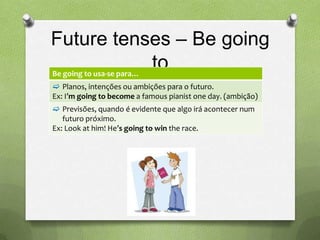Preparando o inglês
- 1. Preparando o Inglês… (Gramática) Preparação para a Ficha de Avaliação (22 de outubro de 2012)
- 2. Present simple vs Present continuous Present Simple Present Continuous √ Rotinas diárias, hábitos, ações repetidas. √ Ações a decorrer no momento em que se Ex: He goes to school by bus every day. fala. Ex: I’m surfing the Net at the moment. √ Estados permanentes. √ Situações em mudança. Ex: He works in a bank. Ex: It’s getting hotter as summer approaches. √ Horários, itinerários. √ Situações temporárias. Ex: The train to France leaves at 8:00 am. Ex: He’s taking a writting course this month. √ Verdades universais e leis da Natureza. √ Com always, constantly, etc. para exprimir Ex: The sun sets in the west. aborrecimento. Ex: You’re always interrupting me when I’m talking. √ Comentários desportivos, críticas e √ Compromissos num futuro próximo. narrações. Ex: He’s leaving for Tokyo in two hours. Ex: Jean wins the ball, then he crosses and passes it to Peter.
- 3. Present simple vs Present continuous - exercícios 1. Put the verbs in brackets into de present simple or present continuous. (Põe os verbos nos respetivos espaços com as formas do verbo ‘present simple’ ou ‘present continuous’). a) A: So, how ...1… (the film/end)? B: Well, Diana …2… (find) her friend, Anthony, and …3… (rescue) him. Then, they …4… (set out) in search of Diana’s father, Lord John Asriel. 2. Choose the correct tense. (Escolhe a forma verbal correta.) a) The Wilsons look/are looking for a babysitter these days. b) My friends and I go/ are going to na exhibition at the art gallery this afternoon. c) Do omnivores eat/Are omnivores eating both plants and animals? 3. Look at the picture and write a question and an answer in the present simple or the present continuous. (Olha para a imagem e escreve uma pergunta e uma resposta baseando-te no que vês, no ‘ Present Simple’ ou ‘Continuous’. a) Sarah/have/a karate lesson/now?
- 4. Stative Verbs O Stative verbs – verbos que descrevem um estado em vez de uma ação e por isso não têm forma nos tempos verbais com valor progressivo.
- 5. Future tenses – Will I’m afraid I Will usa-se para… won’t be at work on time. Previsões sobre o futuro, normalmente com os verbos think, believe, expect, etc. as expressões be sure, be afraid, etc. e os advérbios probably, perhaps, certainly, etc. Decisões no local. Ações, eventos, situações que irão acontecer no This skirt is beautiful. I futuro e que não podemos controlar. will take it. Betty will be fifteen Promessas, normalmente com os verbos promise, years old swear, guarantee, etc. ameaças, avisos, pedidos, next week. expetativas com o verbo hope e ofertas. Sure! I’ll I don’t explain it understand is to you! exercice Tom. Will you help me with it?
- 6. Future tenses – Be going Be going to usa-se para… to Planos, intenções ou ambições para o futuro. Ex: I’m going to become a famous pianist one day. (ambição) Previsões, quando é evidente que algo irá acontecer num futuro próximo. Ex: Look at him! He’s going to win the race.
- 7. Exercícios 1. Fill in the gaps with will or be going to. (Preenche os espaços com will ou be going to.) a) What are you doing this morning, Ted? I …1... (buy) tickets for the Coldplay concert. b) You haven’t sent a Christmas card to grandma yet. Oh, I forgot. I …2… (write) one later. c) Kate is very clever. Yes, She …3… (become) a doctor one day. d) It’s so cold today. Yes, it …4… (snow) later.
- 8. Continuação dos exercícios 2. Look at the pictures and fill in the gaps with verbs from the list in the present continuous, will, the present simple or be going to. a) The plane …1… in a few seconds. Words list: b) I’m afraid I …2… to the cinema Become, take, tonight as I’ve got so much land, start, homework to do. not/go, c) It’s just started raining so I …3… answer, get, my umbrella. fly d) The film …4… at 8 o’clock. e) John …5… married at the end of the month. f) I …6… a famous pianist one day. g) Danny …7… to Madrid tonight.
- 9. FIM (da 1ª parte) O Falta: Past simple, continuous (gramática) e vocabulário. Amanhã será colocada a segunda parte deste powerpoint. Bom estudo! O PS: Resolvam os exercicios que conseguirem e caso queiram que corrija entreguem-me. Mais tarde colocarei (talvez) as soluções. O BOM ESTUDO TURMA!!








